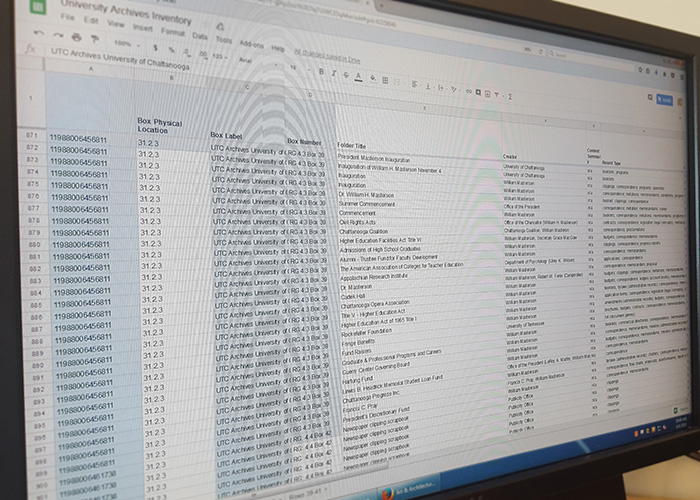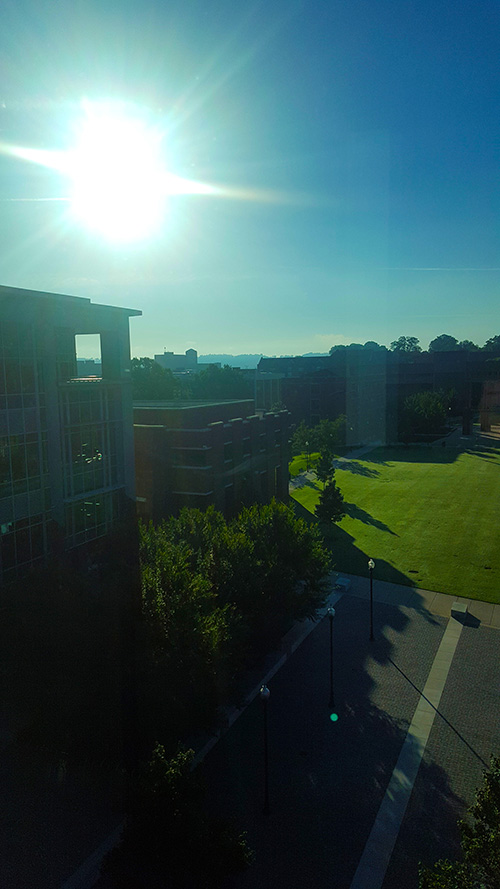This blog post was authored by Aleece Taylor, an intern in the Library’s Special Collections unit from the UTC Department of English in Spring 2018.
When making my decision on an internship, I wanted to seek out an unfamiliar field that would challenge me. Many affiliated with the English department might desire to write and publish for their internship (and career), but I wanted to try a different direction for myself. Since I was uncertain about my ultimate career choice, it was important that my internship equip me with transferable skills that would be applicable to any future career. Working in Special Collections was unlike anything I’d done professionally, and I was admittedly nervous at first, but I learned quite a bit while being involved in a subject matter I enjoy.
I feel the internship helped me to learn industry-leading methodologies and expand abilities I already possessed in order to be used in a professional space. I was trained to use Describing Archives: A Content Standard(DACS) when archiving materials, and frequently referenced The Getty Research Institute’s Art & Architecture Thesaurus (AAT) when inputting information into the appropriate spreadsheet. In order to access the necessary spreadsheet for the project was working on, I collaborated with the department via cloud-based sharing in Google Sheets.

A large portion of my time was spent with the Faculty Senate meeting minutes. My goal with the Faculty Senate minutes was to have them properly organized and ready to be later shipped out for microfilming. There were times when I would simply be identifying duplicates, or other times when I would be matching reports and other informational documents to their respective meeting. As I needed to make sure the documentation matched the meetings’ agendas, I had to read through the minutes, and it ended up being a humbling experience. As decades worth of minutes were processed, I began noticing professors’ names that I recognized, or who had taught a class I enrolled in. Often, we don’t consider the sheer amount of work that goes on behind-the-scenes in order for our departments to offer us specific programs and courses.

At first, I greatly underestimated the number of documents an archivist needs to process each day. Thanks to feedback I received during my internship, I learned how to prioritize my time in a way that still guaranteed accurate work. While trying to think of how I could implement this feedback to complete projects at a faster pace, I found myself being able to use prior experience that I’d yet to be able to utilize in a workplace environment. One immense timesaver was being able to write functions in Excel that would cut out simple, repetitive entries (i.e. I needed to write “leaf” or “leaves” each time when tallying the page extent for the minutes). Combining these skills helped me build a foundation to work with throughout the semester, and in my future career.
By helping archive UTC documents, I saw generations unfold in my hands. There were innumerable correspondence detailing major points in our nation’s history, such as: World Wars I and II, the civil rights movement and first wave feminism. I witnessed students, faculty and staff fighting for equal education rights, and the lengths they went to insure they would be heard. From the thousands of these documents, there was one line in a report from a Mr. Seigle concerning the importance of expanding options for higher education that particularly resonated with me:
“In a world of uncertainty and constant change, the only entity we can count on is the individual who continues to be and become.”
The thought of branching away from my comfort zone and leaving the academic arena rattled my nerves, but I chose an internship for this reason. I needed to experience a dynamic I was unaccustomed to and working in Special Collections has helped prepare me for a new type of work environment.
Plus, the view wasn’t too bad, either.
